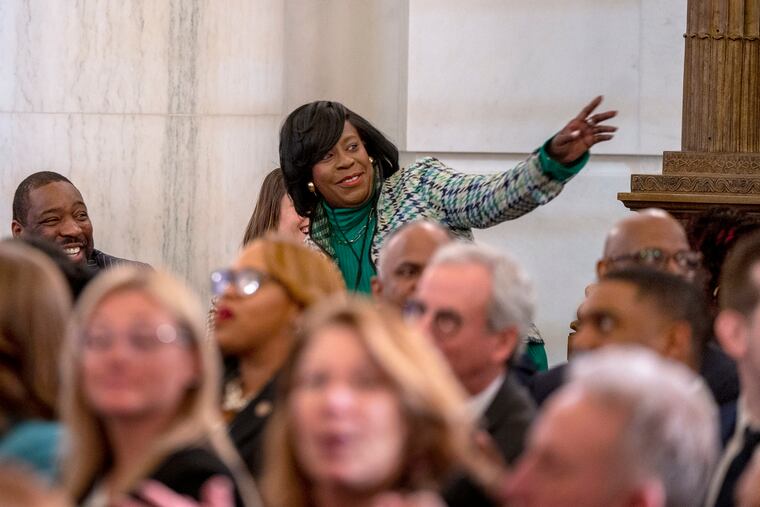More money for schools, some SEPTA funding, and a $15 minimum wage: What Gov. Josh Shapiro’s budget proposal means for Philly
Mayor Cherelle L. Parker traveled to Harrisburg with other city leaders to hear the governor's budget address in person. She said it's "a great place for us to start.”

Gov. Josh Shapiro’s $48.3 billion state budget proposal includes reforms to education funding, more money for public transit, and no tax increases.
Philadelphia Mayor Cherelle L. Parker, a former Democratic state representative, traveled to Harrisburg to hear Shapiro’s address Tuesday — and learn about how the proposed spending plan could impact Philadelphia.
» READ MORE: Money for K-12, recreational weed, and minimum wage: Gov. Shapiro delivers an ambitious $48.34 billion state budget
Here’s what the governor’s plan would mean for Philadelphia and what city leaders are saying about it:
What did Parker say?
Parker, who took office last month, has outlined many goals that will require assistance or cooperation from Harrisburg. She returned to Harrisburg for the first time as Philly’s mayor to attended Shapiro’s budget address in the Capitol rotunda.
She called the Democratic governor’s proposal “a great place for us to start.”
“My budget and fiscal and legislative teams will closely analyze this proposal, and we will work with legislative leaders, the Philadelphia delegation and my intergovernmental affairs roundtable to ensure we’re doing everything in our power to secure every dollar necessary to help meet Philadelphia’s priorities,” she said in an interview after his speech.
» READ MORE: Cherelle Parker spent 10 years in Harrisburg. That could pay off for Philly.
Parker applauded several parts of the budget plan, including a $600 million investment in economic development and Shapiro’s proposal to merge the governing apparatuses for state-owned universities and community colleges while increasing funding for both.
Of Shapiro’s push to raise the state minimum wage to $15 per hour — from the current $7.25 per hour, the federal minimum — Parker said she “strongly endorses this and will fight for its passage.”
“If the increase is approved, it will be the most significant difference in raising the standard of living for working people and their families living at or below the poverty level — across Philadelphia and the region,” Parker said.
Parker will deliver her own budget address — the first of her administration — to City Council in March.
K-12 education funding up
Shapiro on Tuesday proposed almost $1.1 billion in new K-12 education funding, including $872 million that will be dispersed through an “adequacy formula” that steers more money to struggling districts such as Philadelphia. The proposal represents the governor’s attempt to fix the state’s school funding system, which was ruled unconstitutional by the Commonwealth Court last year.
That’s just a start toward what lawmakers think is needed to fix the state’s school funding problems. A legislative committee recommended fixes totaling $9 billion over seven years, and State Rep. Morgan Cephas, a Democrat who chairs the Philadelphia delegation, on Wednesday called it a “down payment.”
State Rep. Elizabeth Fiedler (D., Phila.) said the new money represented “the largest single-year increase ever” in Pennsylvania K-12 funding.
“That is tremendously exciting,” Fiedler said at a news conference Wednesday. “It’s a little bit hard for me to believe that it’s real.”
How much will Philly schools get?
The Philly school district’s budget is $4.5 billion for the 2023-24 school year. That includes $1.49 billion from the state’s basic education funding formula — about 18.9% of the statewide total. For next year, Philly was poised to get an additional $40 million more out of a statewide total of $200 million distributed through the formula.
But city schools would get much more under Shapiro’s “adequacy formula,” if it is approved by the legislature. Philly would get an additional $202.6 million under the proposal, about 23.3% of the new pool of money.
That would mean the state next year would send city schools an additional $242.7 million, representing about 22.7% of the entire K-12 basic education funding increase distributed by the state. That’s a more than 16% increase in state aid for Philadelphia’s basic education operations, for a total of almost $1.75 billion.
» READ MORE: Pa.’s school funding was supposed to be revamped. Will Gov. Shapiro’s budget get the job done?
But even if Shapiro’s funding increases make it through the legislature unscathed, it is unlikely to be a panacea for Philly schools. Before Tuesday’s announcement, the district projected it would have a $407 million shortfall at the end of this year.
Separately, Shapiro on Tuesday proposed spending $300 million to improve school buildings across the state. That includes $175 million that lawmakers said Wednesday was set aside for Philadelphia, the epicenter of a crisis over aging school facilities that lack air-conditioning or are at risk of exposing students and staff to asbestos and lead.
SEPTA gets more, but not enough
Parker said that she will push further on funding for SEPTA.
Philly’s regional transit agency is projecting that it will face a $240 million deficit this year due to the exhaustion of federal funding that was doled out to help transit agencies weather the pandemic.
» READ MORE: Can Gov. Shapiro’s SEPTA proposal save SEPTA? It depends.
Shapiro on Tuesday proposed shifting sales tax revenue so that an additional $160 million was directed to SEPTA.
“We have to make sure SEPTA gets to that $240 million mark so that we don’t see a cut in services in any way, shape or form,” Parker added.
Staff writers Maddie Hanna, Kristen A. Graham, and Thomas Fitzgerald contributed to this article.